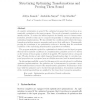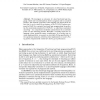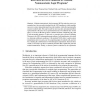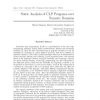194 search results - page 32 / 39 » Justifications for Logic Programs under Answer Set Semantics |
96
Voted
ENTCS
2007
15 years 1 months ago
2007
A compiler optimization is sound if the optimized program that it produces is semantically equivalent to the input program. The proofs of semantic equivalence are usually tedious....
130
Voted
AGP
2003
IEEE
15 years 7 months ago
2003
IEEE
Abstract The Semantic Web (SW) can be seen as abstract representation and exchange of data and metadata. Metadata is given in terms of data mark-up and reference to shared, Web-acc...
121
click to vote
PLILP
1994
Springer
15 years 6 months ago
1994
Springer
Abstract. We investigate an extension of a lazy functional logic language, which uses term disequations both in programs and in computed answers. The semantic properties of the lan...
92
Voted
LPNMR
2009
Springer
15 years 8 months ago
2009
Springer
Modular nonmonotonic logic programs (MLPs) under the answer-set semantics have been recently introduced as an ASP formalism in which modules can receive context-dependent input fro...
160
click to vote
SAS
1992
Springer
15 years 5 months ago
1992
Springer
Abstract Constraint logic programming (CLP) is a generalization of the pure logic programming paradigm, having similar model-theoretic, fixpoint and operational semantics [9]. Sinc...




